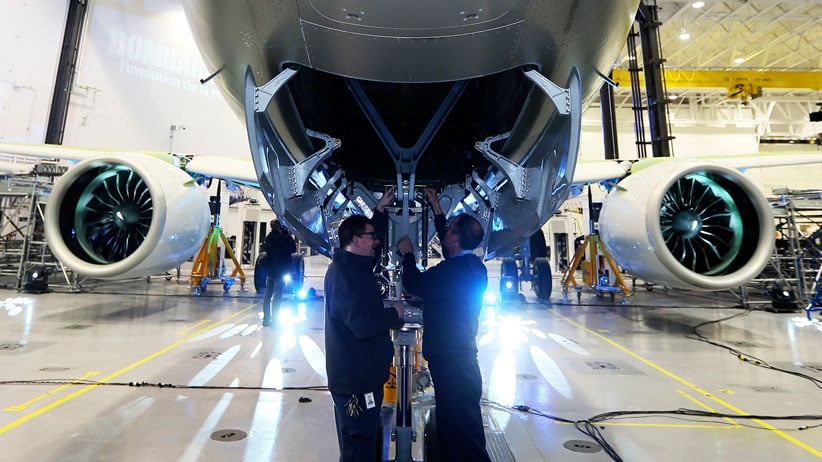Actually, Quebec’s Bombardier bailout isn’t as crazy as it sounds
As taxpayer-funded gambles go, there have been riskier ones than Quebec’s flyer on the Bombardier CSeries jet
Bombardier workers look at the CS300 aircraft after it was unveiled at a news conference at its assembly facility in Mirabel, Quebec, March 7, 2013. Christinne Muschi/Reuters
Share
 Quebec’s decision to plow $1 billion into Bombardier’s troubled CSeries jet program will no doubt be viewed by many as ill-advised “corporate welfare”—yet another example of throwing good money after bad. But that doesn’t necessarily mean it will be a rotten deal for taxpayers.
Quebec’s decision to plow $1 billion into Bombardier’s troubled CSeries jet program will no doubt be viewed by many as ill-advised “corporate welfare”—yet another example of throwing good money after bad. But that doesn’t necessarily mean it will be a rotten deal for taxpayers.
On the heels of a posting a $4.9-billion quarterly loss, which included a write down on the CSeries, Bombardier revealed Thursday the province will receive a 49.5 per cent stake in the CSeries in exchange for its billion-dollar “investment,” the latest in a long line of taxpayer help the company has received over the years. The CSeries, first launched in 2008 as a highly fuel-efficient alternative to the smaller jets built by industry titans Airbus and Boeing, is more than two years behind schedule and at least $2 billion over budget.
Such bailouts certainly aren’t unheard of in Canada. Both Ontario and the federal government invested more than $13 billion in the auto sector back in 2009. While the full amount was never recouped, Canadian politicians nevertheless deemed it a success because the program helped prevent the sector’s collapse and protected thousands of jobs. Similarly, Quebec Premier Philippe Couillard noted that Bombardier employs 18,000 workers in Quebec and anchors the province’s sizable aerospace sector.
Moreover, there’s still reason to be optimistic about the CSeries. Unlike Ford, GM and Chrysler, which are at risk of having their current renaissance sideswiped by tougher emissions regulations, the rise of car-sharing schemes and driverless vehicles, the market for commercial aircraft seems comparatively bright. The industry continues to grow around the world and many airlines are expected to replace their aging fleets in the coming years. And, by most accounts, the CSeries is a capable next-generation airplane, albeit one that has yet to fly a single paying passenger. “The market is there, our leadership is in place, we have the best product and with the support of the government, we are ready to make this aircraft a commercial success,” said Alain Bellemare, Bombardier’s CEO, in a statement.
The question, then, is whether Bellemare can execute on a CSeries project that was launched by his predecessor, and that’s expected to cost another $2 billion this year and next. So far, both Airbus and Boeing have managed to blunt the CSeries’ appeal by slapping new, more fuel-efficient engines on their existing jets. While the “re-engined” models don’t quite match the potential cost-savings promised by the CSeries, which also incorporates lightweight carbon fibre components in its design, the refurbished planes have proven to be an attractive alternative for airlines who remain uncertain about Bombardier’s ability to deliver in a brand new segment. The numbers tell the tale: Airbus’s A320neo (new engine option) boasts more than 4,100 firm orders, while Boeing’s 737 MAX has more than 2,800. By contrast, Bombardier only has 243 firm orders for the plane on Bombardier’s books (it needs about 300 to break even on the project).
If Bombardier can avoid further delays (not uncommon in the industry, as evidenced by Boeing’s drawn-out 787 “Dreamliner” saga), Bellemare stands a reasonable chance of pulling the CSeries program out of the fire—particularly since 97 per cent of flight testing is now complete. Indeed, some analysts believe that Bombardier will have a much easier time inking orders once CSeries jets are actually rolling off the production line and speeding down runways. Others predict there could ultimately be demand for as many as 2,500 aircraft in the market Bombardier is targeting with the CSeries, as evidenced by rumours U.S. carriers JetBlue Airways and United Airlines are considering the aircraft.
None of this is guaranteed, of course. The CSeries may still turn out to be a giant flop. Or, more likely, Bombardier will run into yet another unexpected hiccup. But, as taxpayer-funded gambles go, there have certainly been riskier ones.